Transcription
BROUGHT TO YOU BY:
FREE SPEECH CENTRAL
MINORITY CHAIRMAN REPORT
January 2016
REPORT
In December of 2016--before I became seated as Minority Co-camp Chairman-- our Inmate Council's Executive Board met with the administration for their monthly meeting. At that meeting—according to the Council—they addressed one of the major issues that we have here with having to bathe in and drink brown water every day. According to the Council's report, the administration assured the Executive Board that brown water was safe to drink, and that it does not cause any harm to the human body. When asked if he would drink the water, the Superintendent acknowledged that he would not, nor would he force his staff to drink it. They further reported that a water treatment facility was in the process of being built, and that it should take approximately 18 months to rectify the water issue.
Comment
The safety of our drinking water has been a concern for prisoners for years, especially here at MCI-Norfolk. Staff members do not drink the water, and our visits are warned when entering the facility to not drink the water. Just recently, staff was allowed to increase the amount of drinking water that they bring in. Every day--since November 2016--our water has been coffee brown in the morning, and throughout the day on some occasions, and the institution has been trying to remedy the problem by flushing every night. The incarcerated population has been told on several occasions that the Department of Corrections (DOC) have their own people to come and test the water periodically, and that the tests are negative for harmful materials.
We need an independent source to test MCI-Norfolk's drinking water. The water should not be tested at the wells, but out of the tap in the housing units, especially in unit 4-1.
REPORT
On January 3, 2017, I was seated as the Minority Co-camp Chairman of the Norfolk Inmate Council. On January 17, 2017, we had our monthly meeting with the administration (Inmate Council agenda enclosed). We amended the agenda in order to place item #4 first. A fellow prisoner, who was invited as a guest, made a presentation for the administration to consider allowing cable television (see enclosed document titled "Notes on Cable"). In response to our guest's presentation, the Superintendent stated that he would not have a problem with prisoners having cable television, however, his concern was that the public may not be so accepting of the idea. He voiced his concern about the potential for the media to give negative reports about prisoners having cable. He offered to support it if we could find a way to get over that hurdle. We then moved to Item #1, which were issues surrounding our medical treatment. Our current Majority Co-camp Chairman introduced the issue of improper medical care, and gave several examples of men here, who are in need of care--from cancer to heart conditions--but are not being treated. He argued that the DOC should be able to step in when it comes to serious medical problems. The administration responded that they have no control or say over medical, and encouraged us to write to Stephanie Collins, who is the head medical personnel for the DOC. He stated that prisoners have to advocate on their own when it comes to medical, because technically, medical doesn't have to talk to them about individual cases. I inquired into the problem with incarcerated men seeing outside medical specialists in some circumstances, and when the outside specialist presents a treatment plan, the medical staff here refuses to follow the plan. He replied that medical staff here does not have to follow any treatment plan recommended by outside specialists. We then moved to Item #2, at which time our Majority Co-camp Chairman addressed problems that the men here were having with their property coming up missing when they got lugged to the hole. He proposed that the administration go back to the old system of having the officers log all of a person's property items into an inventory sheet, once their cells are packed. The administration rebutted that when a person's cell is packed, the officer places all of the individual's property into a plastic seal bag, which gets sealed and tagged by the lieutenant, who is responsible for making sure the property is secured. The administration suggested that if there were any property missing, that it is because the incarcerated property workers are stealing it, and therefore, they would need to be responsible for their actions. We finally moved to Item #3, where we addressed the closing of the gym. Our Majority Co-camp Chairman spoke about the shortage on recreational officers, and the effects of not being able to keep the gym open. He argued that keeping the gym closed caused idleness, and can result in people seeking excitement in negative things. He discussed the fact that we only have three staff persons for the gym, and that we will be losing two of these soon which will cause the gym to be closed more often. The Superintendent acknowledged that idle time can get to people, but explained that it is tough to staff recreational officers. He also explained that the pool of transfers were getting slim. He assured us that he has asked for transfers, but have not received a response. Our meeting at this time was interrupted by an emergency in one of the housing units, and we were forced to adjourn early.
Comment
Though all of the above issues are very important, I think that two things deserve emphasis. In regards to the cable proposal, the problem that we face is the administrative fear of the media and public opinion. Prisoners have lost a lot of privileges over the years simply because the media made a fuss about something that we were allowed to do. In fact, the cultural shift at MCI-Norfolk is largely due to the media's criticism of prisoner privileges--though that's not all to blame--and this culture shift has resulted in the technical increase in the level of security of the institution. Norfolk today is more of a level 5 security prison, and has lost its uniqueness in being a successful rehabilitative project. The negative media output has been a tremendous force in decreasing rehabilitation, and increasing recidivism. If society's thinking today is that men and women who are in prison should be in prison being punished, then any conversation of rehabilitation is unnecessary. Taking things from prisoners, and keeping prisoners uninvolved in the technological evolution of the world, has not proven in any way to be a proper solution to curb criminal thinking. Instead, it promotes it. Society should not care that prisoners are watching TV. They should instead be concerned about whether or not we are killing each other or staff, and/or engaging in criminal activity while we are incarcerated. Watching TV hardly suffices as criminal activity. In regards to our medical issues, it is quite troubling to think that the warden of a prison facility has no say over the medical personnel who works in his facility. Medical treatment in prison is extremely problematic, and where there is neglect and abuse of powers, it would be unreasonable to accept that a Superintendent cannot intervene. It's no wonder why prisoners consider getting sick to be the doom of them. Medical staff can misdiagnose you, give you the wrong medications, ignore recommended treatment plans, neglect to send people out for necessary surgeries and other treatments, and charge us for requesting to be seen, and the warden can do nothing about it? I'm not sure how to pursue this.
REPORT
On January 19, 2017, the two other Co-camp Chairmen and myself were called to the administration building for a follow-up meeting. Our Secretary was not called, and therefore was not present to take minutes. Or Majority Co-camp Chairman was called to an attorney visit, and therefore was not able to attend. The meeting was to continue our meeting of January 17th. Our Senior Co-camp Chairman decided to table the rest of the agenda until our February meeting, since the rest of the Inmate Council's Executive Board were not present. The Superintendent honored the request. He (the Superintendent) did however, want to have a discussion about the hunger strikes, and the drug and home-brew epidemic here at MCI-Norfolk. He began the conversation by insisting that he will not tolerate hunger strikes or protests. He expressed that he was not made aware of the issue that resulted in the hunger strike, and that had he or anyone else in his administration been made aware of the issue, it could have easily been remedied. The Senior Co-camp Chairman agreed that nothing gets accomplished by not communicating. We then moved on to the issue regarding home-brew. The Superintendent started by introducing the fact that drugs and home-brew has increased dramatically. They asked that the Inmate Council assist in warning the incarcerated population that if the home-brew doesn't stop, they will look into taking things away, i.e., sugar, and cooking privileges of offending housing units. Since I did not agree with the practice of taking things away as a remedy to a problem, I suggested that the administration take a look at the real cause of the problem, and I discussed the fact that if the administration were to take a look at MCI-Norfolk fifteen years back, and see the things that Norfolk had then in comparison to now, they would see that this prison fifteen years ago, and this prison today are two completely different prisons. I argued that the problem with drugs and violence at MCI-Norfolk today, comes from the perpetual taking of property and privileges over a period of time. Because "taking" has been so fundamental in the negative cultural shift that exist today, threatening to take more will hardly prove to remedy the problem. I asked the administration, Why they don't give the population an incentive to get involved, i.e., if collectively as a community, we can reduce home-brew by 15% in the next six months, they'll "give" us something. By rewarding us, it would be easier to get the population involved in remedying the problem. The administration answered that they are not looking to give us anything, and argued that they had already given us the Restorative Justice Program, and the Re-entry Center. We argued that those programs had nothing to do with idle time. The Superintendent recognized that idle time is a problem, but demanded that we inform the population of his discontent with the home-brew.
Comment
MCI-Norfolk was a prison that was designed in a unique way. It was an experiment, designed to see whether or not providing prisoners more liberties and responsibilities would curb recidivism. Norfolk worked in its past. Over the years--as new administration took the helms--more and more things were changed, which had a negative effect on prisoners' behavior. Coupled with the taking of privileges, was the change in the classification system, which caused anyone to be allowed to be placed at MCI-Norfolk. Where Norfolk was once a place Where men had to earn their stay, and be in pursuit of positive goals, the classification system invited all of the problems of other facilities, by paving the way for people who were not in a positive mind-set to gain entrance. Today, MCI-Norfolk is filled with violence and drugs, and the only promise is the threat of having more things taken from the incarcerated population. MCI-Norfolk still has more to offer than any other prison--I speculate--but it is no longer the rehabilitative example that it once was.
REPORT
On January 25, 2017, the two other Co-camp. Chairmen and myself were called to a meeting with the Deputy Superintendent, the Director of Security, and a Captain. Our Secretary was not called in to record the meeting. The meeting was in progress when I arrived. The Deputy shared some information with as regarding the housing areas that were prevalent in staff finding home-brew. She informed as that the Superintendent was in the process of making plans to remove sugar from the institution, and that staff were being ordered to tighten up on some of the rules surrounding possessing fruit in ones cell, and bringing personal bowls to the dining area during that time. We reiterated the conversation about taking things--especially from the majority of people who are not breaking the rules--would not remedy the problem. The administration implied that we have a responsibility to intervene When we know that people are doing drugs. We spoke about the loss of that kind of community thinking, and pointed out the cultural change in the behavior and thinking of the men here. We emphasized that without incentive, the greater part of the population will not get involved in intervention. I engaged the Deputy in a real conversation about the problem, and mentioned to her that taking things from us will only cause the incarcerated population to become angry, and that would place one problem on top of another. She mentioned that the administration was already upset, and that they would take drastic measures if we can't remedy the problem. I suggested that the fire-against-fire approach wouldn't amount to anything. Towards the end of the meeting, the Superintendent entered the room, and discussed some of his plans. Our Latino Co-camp Chairman, and Majority Co-camp Chairman asked the administration for time to address the matter with population, and the Superintendent afforded as two days.
Comment
The two other Executive Board Chairmen, the Secretary, and I met up in order to discuss the matter further. My suggestion to not submit any solutions was voted down. The Executive Board felt that we should at least submit something, in order to see whether or not the administration would respond in the positive. A few suggestions were discussed. The problem is that, although the suggestions will help treat the symptoms of the drug crisis at MCI-Norfolk, they do not address the root of the problem, which is more administratively based.
REPORT
On January 27, 2017, we met with the administration in order to further address the home-brew issue. Our Latino Co-camp Chairman presented a proposed solutions report (enclosed titled "Home-Brew"). The administration took a moment to peruse the report, and voiced their satisfaction with our suggestions. We discussed the logistics of implementing some of the suggestions. We were told that the items under the heading "Alternative Solutions" were out of the administration's control. They did however, speak favorably in some of the other areas. Before the meeting concluded, I inquired into the matter at hand, and asked about the current plans to take the sugar from the facility. The Superintendent assured us that for the time being, he will only tighten up on the rules, but that he is still giving a serious look at removing all of the sugar from the prison.
Comment
Whether or not the Executive Board participates in orientation, videos, and other endeavors, my concern is that the root of the problem will remain un-addressed. I believe that as long as the administrative thinking is centered around punishment, the negative environment will only continue to grow. In the grand scheme of incarceration, punishment only, has not proven to serve as an effective means of rehabilitation. Superintendent Howard Gill--in the 30's--refused to hire anti-prisoner-minded officials, because he knew that the manner in which staff thinks and behaves, affects the very environment as a whole. Today, there is no discretion in hiring or attitude of staff, and therefore, there cannot be any reasonable belief that things can get better.
End Report
[Signature]
FREE SPEECH CENTRAL
February 13, 2017
Other posts by this author
|
2017 jun 24

|
2017 jun 24

|
2017 jun 24

|
2017 jun 24
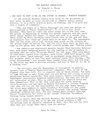
|
2017 jun 18
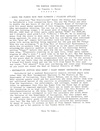
|
2017 jun 15
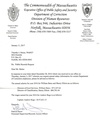
|
More... |

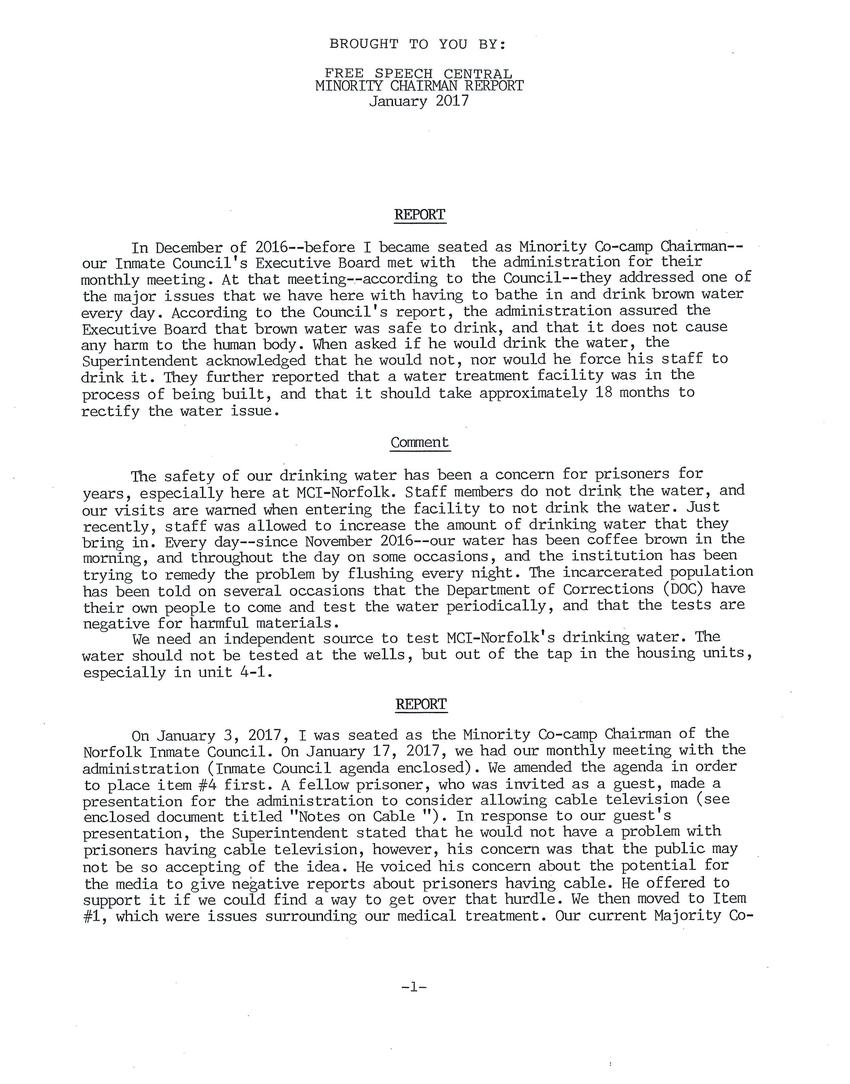
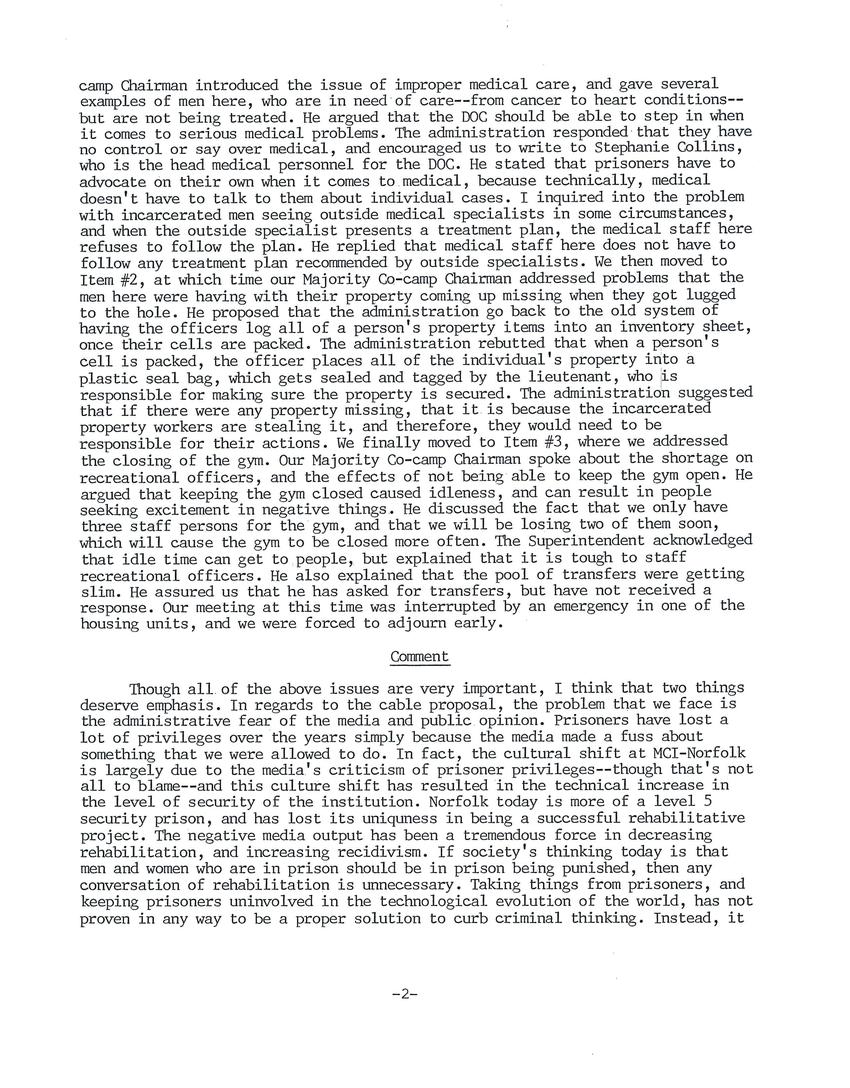
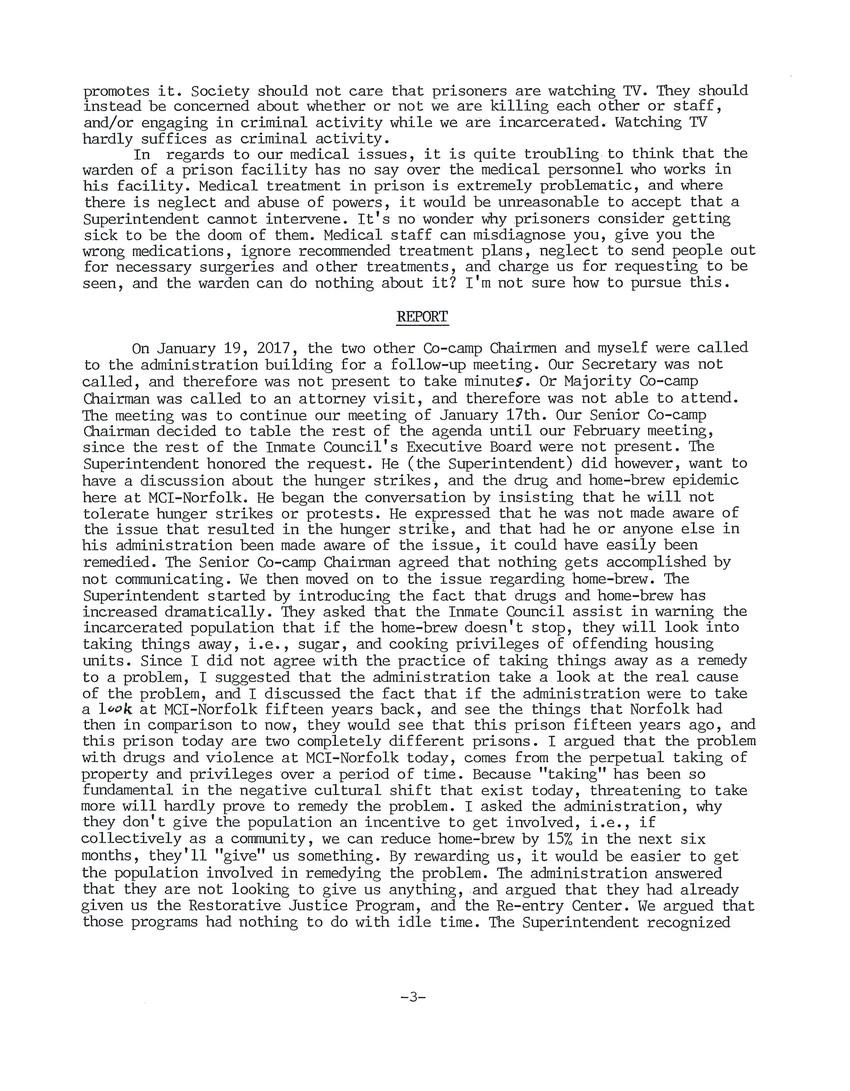
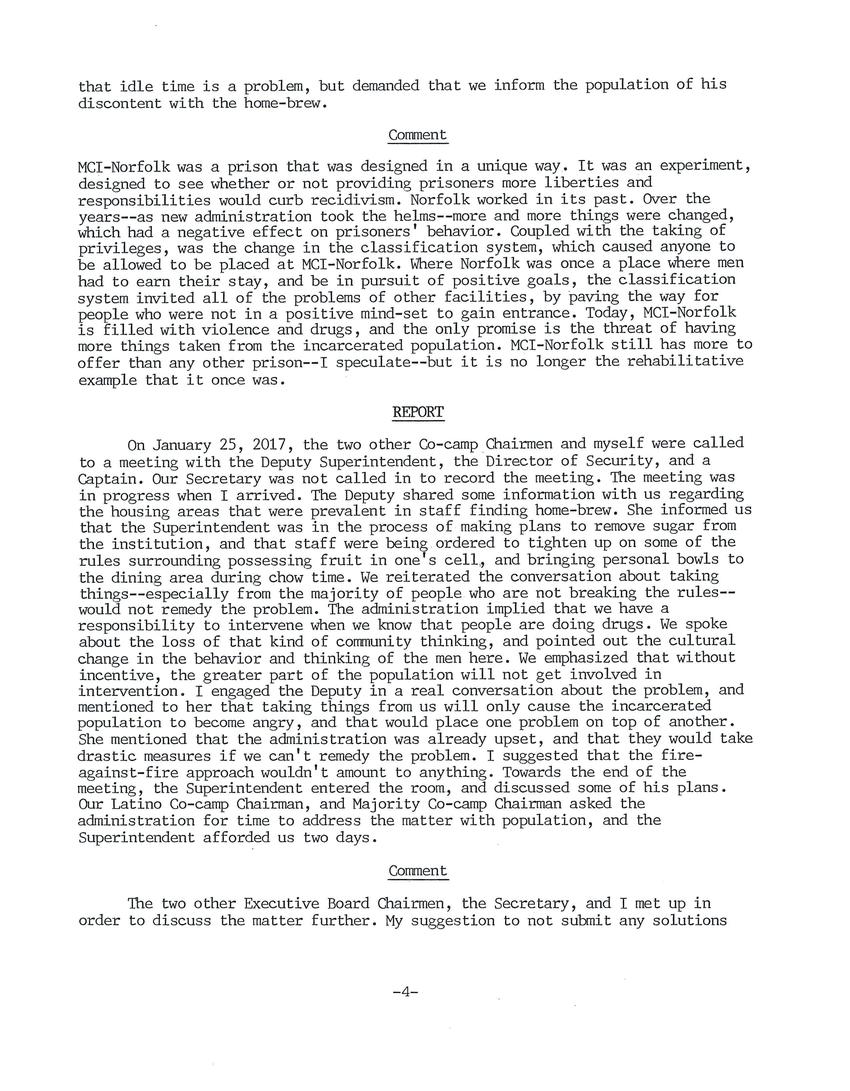
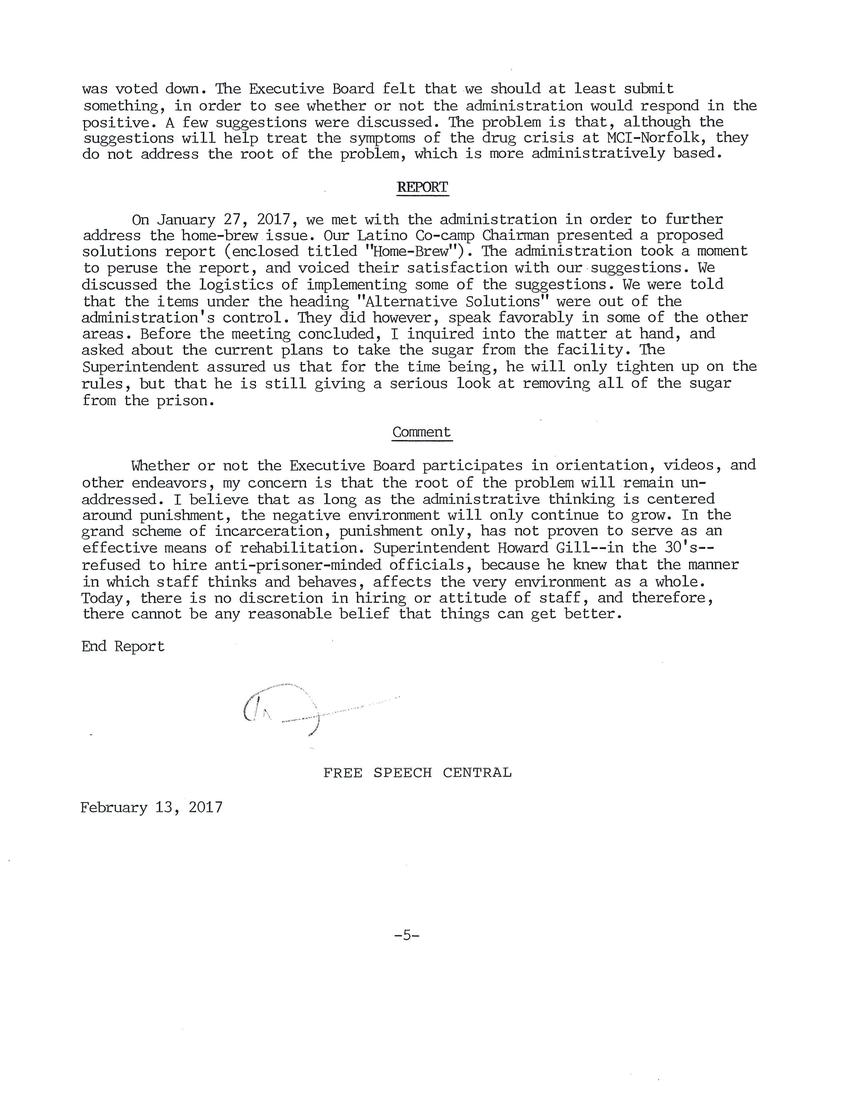

Replies